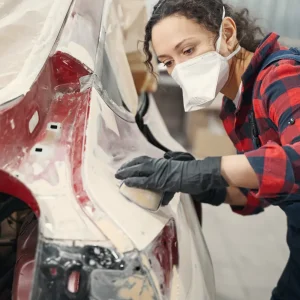Unlike many other fleets during the pandemic, the Anglian Water fleet maintained business as usual.
Despite the uncertainties of the times, the company’s commitment to its customers’ needs never wavered even in the face of unprecedented difficulties, ensuring they continued to receive reliable water and wastewater services with a number of safety precautions in place.
“When you turned your tap on, you still expected water to come out, and when you flushed your toilet you still expected things to go away,” Mick Farmer, the water company’s head of fleet services tells us.
Starting his career as a heavy goods technician, Farmer quickly moved into fleet management, working for various organisations and heading up the fleet service at the Ambulance Service. Nearly four years ago, Farmer took on the role at Anglian Water, bringing with him extensive knowledge of developing and implementing best practice fleet management policies.
“The main difference between the ambulance and water sectors is ambulance had one single priority – to get to people in a short amount of time – whereas the water sector has lots of different priorities,” explains Farmer.
While the company visits its water source and treatment sites every day to take samples,
a huge part of water quality monitoring involves sampling water at around 12,000 homes and businesses every year.
Keeping the UK’s water flowing
Travelling around the region is therefore essential for Anglian’s teams to be able to keep taps flowing and toilets flushing every day, making the fleet a vital resource. Anglian Water vans currently cover 20 million miles on the road each year, which is the equivalent of driving from the Earth to the Moon and back about 42 times.
The user-chooser fleet consists of 1,000 cars, 2,000 vans, and a broad range of car marques and models. “We provide standards to our drivers on the vehicle they can choose and that excludes premium and lower-end brands, for example, but as long as we’re happy for the vehicle to be on the fleet for three to four years, they can choose it,” Farmer explains.
Love Every Drop
The water company’s slogan is Love Every Drop, and this seemingly doesn’t only apply to the water it manages.
While travel around the Cambridgeshire region (where it is headquartered) and around a fifth of England and Wales (where it serves) is essential for the fleet, Farmer and his team are aware traditional petrol and diesel engines produce a significant part of our carbon emissions every year.
As one of the largest energy users in the East, Farmer says it’s Anglian’s responsibility to do all it can to minimise its impact on the environment, and growing its electric vehicle fleet and chargers is a great step for it in doing so. “This choice offers an exciting opportunity to build a sustainable future while continuing to do what we do best,” Farmer says.
The company’s efforts to accelerate its e-mobility advance recently saw more than 300 electrified vehicles coming to the East of England and another 300 vehicles on order to join an existing fleet of electric and hybrid vans, including 33 Opel/Vauxhall Vivaro-e vans. The fleet of company cars which currently comprises 280 EVs is also increasing.
Anglian Water recently made the headlines as it debuted the UK utility industry’s first fully electric jetting 4-tonne van on the region’s roads. The van will be used for industrial sewer cleaning, providing silent operation and allowing the company to minimise disruption and noise in communities during late-night call-outs. It also marks a significant step in the fleet’s decarbonisation efforts. Farmer explains, “Every year, our vans drive 20 million miles – the equivalent of going to the moon and back 24 times – so going electric is essential for us to reach net zero by 2030.”
The company’s net zero route map, launched in 2021, involves the whole company decarbonising its electricity supply, vehicle fleet, as well as focusing on procuring green electricity. The route map forms part of the world-leading net zero commitment by the entire water sector, made in 2020. Each year until 2030, Anglian commits to reduce its carbon emissions, and by 2030 its operational emissions will have reduced by more than 70% against a 2018/19 baseline – a cut of more than 250,000 tonnes, equivalent to the energy consumption of about 28,000 homes.
This will see the fleet replace 90% of small vehicles with electric equivalents, medium-sized vehicles moved to hydrogen or alternative fuels, and 55% of HGVs using liquefied natural gas by 2030.
“Increasing our fleet of electric vehicles provides us with the opportunity to utilise more renewable and sustainable technology, helping to make a positive impact on our region’s environment, and reach the industry’s ambition to reach net zero by 2030.”
In May last year, the company also launched a salary sacrifice scheme through Tusker, which allows employees to lease an electric car for a fixed monthly amount taken directly from their gross salary.
The scheme, which is purely EV-focused, has been made available to all of the company’s staff members, not just higher-rate taxpayers. This has given employees that might have previously been excluded from a traditional car scheme access to new, green and affordable vehicles, while helping to lower Anglian Water’s overall fleet emissions.
The adoption of the Tusker scheme followed a review of its business travel and company car policies by Anglian Water a few years before which, in line with its sustainability objectives, introduced a policy that favoured only Ultra Low Emissions Vehicles for those able to claim a company car. This policy was further revised in 2021, to one in which all employees became eligible for a vehicle, although the scheme included only pure EVs and no internal combustion engine vehicles.
With the increasing cost of EVs and the uncertainty of supply, Farmer explains the company increased the monetary value in the bottom two categories of the scheme to allow more cars in. While most manufacturers have a couple of variants in standard and long range, the Anglian fleet only adopts long-range EVs with a range of 300 miles onto the fleet. “This choice gives us greater resilience across the organisation,” he says.
To keep the fleet’s electric vehicles on the road, the company has installed 120 electric charging points across the region. “This means not only can our new electric vans stay charged but our staff can recharge their own electric cars at the company sites too,” explains Farmer. At some sites, these will be powered by renewable energy generated through sources such as combined heat and power, solar and wind: delivering a fully renewable process from end-to-end.
Farmer says his fleet of drivers has taken to electric vehicles well, going as far as to say they love them, and are reaping their many rewards including Benefit-In-Kind tax and a competitive charging cost at 172 of the company’s on-site chargers. But both of these previously cheaper benefits of having an EV are increasing in price.
He explains that diesel cars are still available on the company’s lease portal, with some drivers still opting to choose them. “We have the option of diesel, yes, but if you pick a diesel vehicle you’re absolutely guaranteed to get a call from me asking you the reason why,” says Farmer.
He continues, “We install chargers in fleet drivers’ homes for their vans but it’s the responsibility of the car user to install their own charger at home if they require one. We know the financial benefits of electric aren’t as they were, but we all know there are plenty of benefits to installing a home charger.”
In the cases where the fleet can’t switch to electric, they’re opting for alternative fuels instead. “We’re going to be gradually switching medium-sized vehicles to hydrogen or alternative fuels such as biomethane and we’ll also be changing 55% of our HGVs to using Liquefied Natural Gas. We’ll switch 100% of our gas oil demand to hydrotreated vegetable oil and develop a plan to make the most of the opportunities and benefits for hydrogen across everything we do.”
All demand, no supply
Just like all fleets in the current climate, Anglian has faced difficulties with vehicle supply. “Luckily, we have some fantastic relationships with car and van suppliers, whether through local dealerships or suppliers,” Farmer explains.
The fleet recently ordered 60 electric cars for stock, which Farmer says is scary because of volume and cost. “Given the challenges around supply we took that decision knowing full well we had plenty of cars due for replacement after their lease cycle, and people would willingly take them,” he explains.
Going forward, Farmer believes electric has a bright future. He says, “I think manufacturers will focus on the electric product as hydrogen still isn’t viable unless your fleet operates in the main artery of London.”
By providing sustainable vehicles and charging infrastructure, Anglian Water is doing its part in increasing the industry’s positive impact on the environment, and its efforts to reduce carbon emissions are a significant step towards a greener future, putting it on track to reach net zero by 2030.





